
Concert Programs
Polish Music Spring: Celebrating Bacewicz & Szymanowski
The USC Polish Music Center presents works by pioneering Polish composer and polymath, Grażyna Bacewicz, performed by pianist and USC Thornton faculty member Bernadene Blaha and the Verona Quartet.
Winners of the 2020 Cleveland Quartet Award, the sought-after Verona Quartet will also hold a masterclass on campus during their residency at USC.


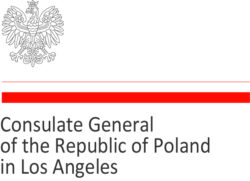
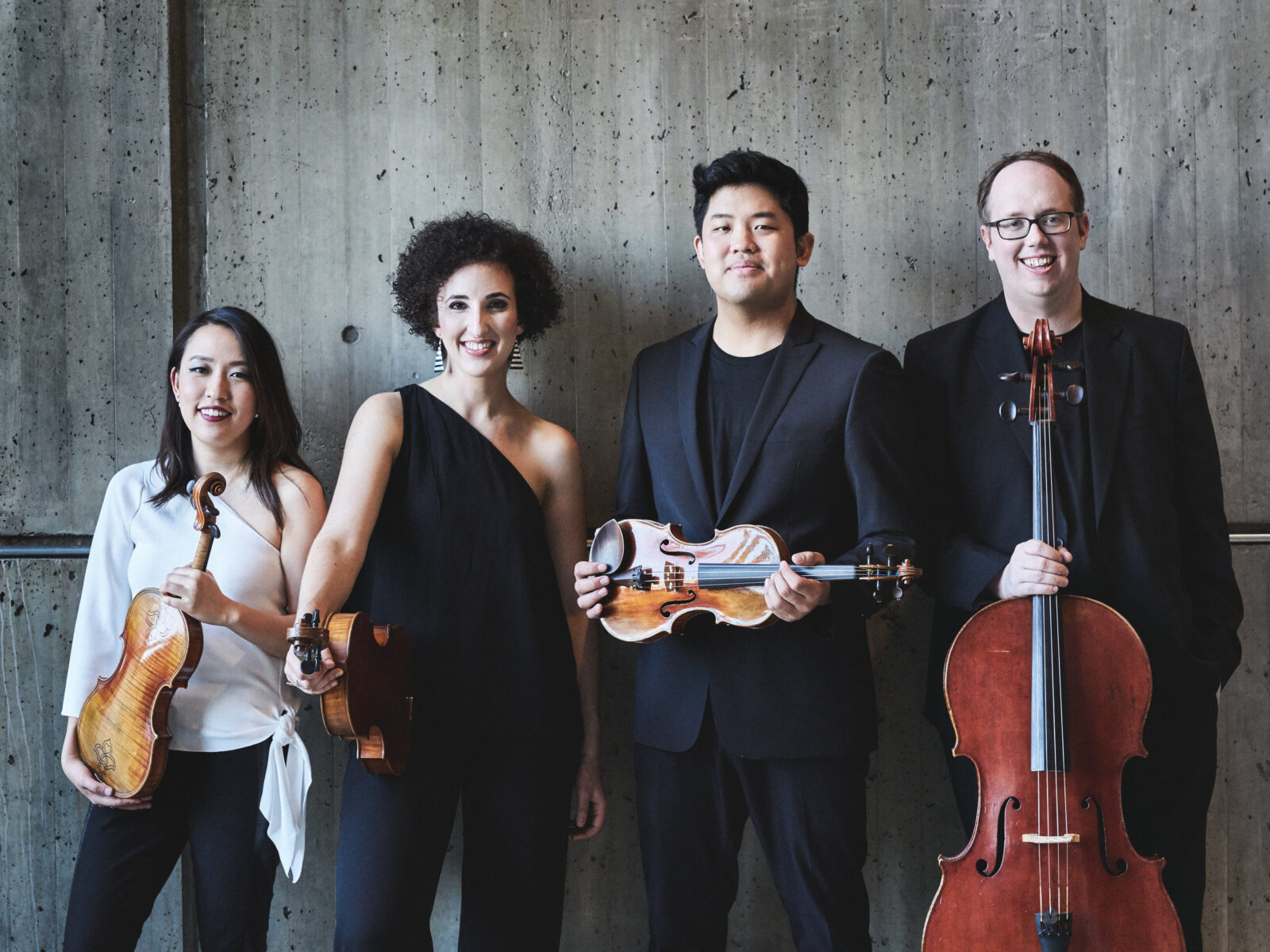
Program
String Quartet No. 4
(1951)
I. Andante. Allegro molto
II. Andante
III. Allegro giocoso
Grażyna Bacewicz
(1909-1969)
String Quartet No. 2, Op. 56
(1927)
I. Moderato, dolce e tranquillo
II. Vivace scherzando
III. Lento
Karol Szymanowski
(1882-1937)
Piano Quintet No. 1
(1952)
I. Moderato molto espressivo
II. Presto
III. Grave
IV. Con passione
Grażyna Bacewicz
(1909-1969)
Program Notes
This afternoon’s program focuses on works by two great masters in the catalogue of Polish twentieth century music, Karol Szymanowski (1882-1937) and Grażyna Bacewicz (1909-1969). Both were strong artistic personalities, and both developed their individual, clearly definable musical styles. To an extent, they also charted paths and served as creative beacons for the younger generations of composers in Poland to follow.
The evolution of Szymanowski’s compositional style initially embraced German post-romanticism at the turn of the twentieth century, and later explored elements of French impressionism during the solitary years of the Great War that he spent on the family estate of Tymoszówka, deep in today’s Ukraine. Leaving the rather idyllic past behind and moving on to newly-independent Poland as soon as the war was over, Szymanowski turned for inspiration to Polish folk idioms, drawing especially on those resonating across the Tatra Mountain highlands. Written in 1927 and premiered in Warsaw in 1929, Szymanowski’s Second String Quartet is a very special work. It combines elements clearly taken from folk music and its subjective concepts of beauty with the return to more traditional notions of classically-inspired formal design. Such a coexistence of widely divergent building blocks can also be found in Szymanowski’s Mazurkas for piano, his Second Violin Concerto and the Symphonie concertante for Piano and Orchestra.
The Quartet’s opening movement, Moderato (with the additional indication: dolce e tranquillo) is based on the sonata form and dominated by the extended lyrical first subject. Entrusted to violin and cello, it soars over the harmonic murmur of the quartet’s inner voices, setting up colorful textures and moods. The second movement, Vivace scherzando, echoes the lively spirits of folk music and—being essentially a rondo—it also reflects typical folk-dance forms. The last movement, Lento, is a double fugue in four parts. Announced by the second violin, the opening fugue’s subject is a freely adapted Tatra Highland melody, which also appears in Szymanowski’s Harnasie ballet and Second Violin Concerto. The fugue’s second subject (appearing once again in the second violin, but this time over a low cello trill) is also derived from the same folk source, and it gradually builds up to the final apotheosis of the work.
Grażyna Bacewicz represents the next generation of Polish composers after Szymanowski. Like her famous predecessor, she too explored traditional classical forms and cultivated a strong interest in Poland’s rich musical folklore. Bacewicz’s Fourth String Quartet is her best-known and most often performed work. Composed in 1951 and entered into a string quartet competition in Liège, Belgium, it won the First Prize and elicited much praise from, among others, Grzegorz Fitelberg, a renowned conductor and close friend of Karol Szymanowski. Bacewicz’s reaction to an avalanche of accolades was typical of her witty, modest, and sober-minded persona—in one of the newspaper interviews she averred simply that “The Quartet consists of three movements, it uses all instruments, and the melodies contain elements of folklore.” Indeed this is a compact, ten-minute work, opening with an Andante introduction that soon morphs into a lively Allegro molto movement proper. Its subjects use both melodic and rhythmic turns taken straight from the mazurka and kujawiak, two dances from central Poland. The Andante second movement brings lullaby-like calm imbued with highly lyrical melodic lines that emerge from complex polyphonic textures. The finale, Allegro giocoso, is indeed a joyous rondo with a robust variety of textures that reach their maxima in the final climax of notes repeated by the entire ensemble.
Dating from 1952, Bacewicz’s Piano Quintet No. 1, is—like her Fourth String Quartet—a strongly neoclassical work cast in three movements. The first, Moderato molto espressivo, opens with a meditative and somewhat mysterious introduction, eventually revealing itself to be a well-designed sonata form based on two subjects treated to the customary development and recapitulation scheme. Marked Presto, the wild second movement is a whirlwind oberek—a folk dance in triple meter and apparently a great favorite of the composer, who here uses its rhythms and unexpected accents to great effect. Calm is restored in the third movement, marked Grave. It’s chorale-like atmosphere builds slowly and inexorably, reaching its emotional summit shortly before fading back to a pianissimo conclusion. The last movement, Con passione, is rather dramatic and dark, filled with angry outbursts at first but eventually leading to a calmer interlude announced by solo piano. As the strings gradually join in, the movement once again regains its pace and culminates in the closing coda marked Grandioso and sostenuto.
-Marek Zebrowski, Program Director – USC Polish Music Center
About the Artists
Verona Quartet
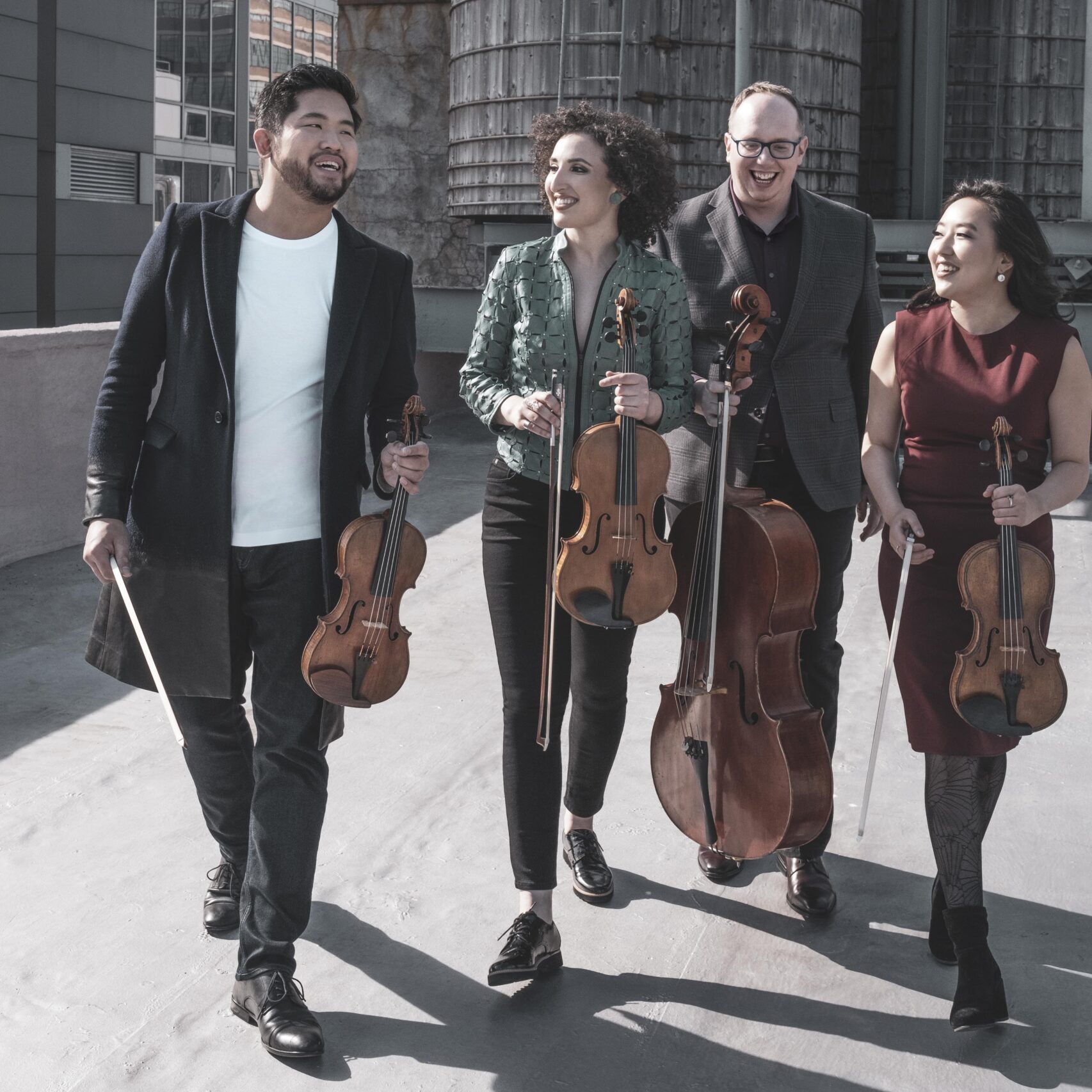
Acclaimed as an “outstanding ensemble…cohesive yet full of temperament” (The New York Times), the Verona Quartet has firmly established itself amongst the most distinguished ensembles on the chamber music scene today. The group’s singular sense of purpose earned them Chamber Music America’s coveted 2020 Cleveland Quartet Award, and a reputation for its “bold interpretive strength, robust characterization and commanding resonance” (Calgary Herald). The Quartet serves on the faculty of the Oberlin College and Conservatory as the Quartet-in-Residence. In addition to its position at Oberlin, the Quartet recently held residencies at Nova Scotia’s Lunenburg Academy of Music Performance, North Carolina’s Chamber Orchestra of the Triangle and the ENCORE Chamber Music Institute. As committed advocates of diverse programming, the Verona Quartet curated the UpClose Chamber Music Series on behalf of the COT, electrifying audiences with their “sensational, powerhouse performance[s]” (Classical Voice America).
The Verona Quartet has appeared across four continents, captivating audiences at venues such as Carnegie Hall, Lincoln Center (New York City), Kennedy Center, Library of Congress, the Smithsonian Institution (Washington, D.C.), Jordan Hall (Boston), Wigmore Hall (U.K.) and Melbourne Recital Hall (Australia), and has performed at festivals including La Jolla Summerfest, Chamber Music Northwest, Caramoor, the Texas Music Festival, Bravo! Vail, and with the Chamber Music Society of Lincoln Center.
In the 2023-24 season, the Verona Quartet will debut at numerous prestigious series across the US and Canada including Clarion Concerts, the Chicago Chamber Music Society, La Jolla Athenaeum, the Hawaii Chamber Music Society, and Music Toronto, among others. The Quartet returns to Honolulu Chamber Music Series, Eureka Chamber Music Series, University of Southern California, and the Isabella Stewart Gardner Museum, and in the spring will embark on its first tour across England. In the summer of 2024, the Quartet looks forward to returning to the Encore Chamber Music Institute and giving their debut at the esteemed Santa Fe Chamber Music Festival.
A string quartet for the 21st century, the Verona Quartet champions the rich breadth of the string quartet repertoire from the time-honored canon through contemporary classics. Notable commissions and premieres include works by composers Julia Adolphe, Texu Kim and Sebastian Currier as well as Michael Gilbertson’s Pulitzer Prize-nominated Quartet. In 2023, the Quartet celebrated several world premieres including a work for string quartet, yangqin (Chinese dulcimer) and dancer by Cheng Jin Koh, commissioned by The Smithsonian Institution in honor of the centennial of the Freer Gallery of Art.
The Verona Quartet’s recently released second album, SHATTER, debuted at #1 on the Billboard Traditional Classical Chart in July 2023. SHATTER showcases works written for the Verona Quartet by American composers Julia Adolphe and Michael Gilbertson as well as Reena Esmail’s Ragamala, in collaboration with Hindustani vocalist Saili Oak. The Verona Quartet’s debut album, Diffusion, was praised by BBC Music Magazine for its “radiant glow” and Cleveland Classical for the “Verona’s technical precision, expressive freedom, and brilliant, dramatic phrasing”. The Quartet’s third album, comprised of Ligeti’s complete string quartets, will be released in December 2023 with Dynamic Records in celebration of the composer’s centennial year.
In addition to promoting contemporary music, the Quartet strives for a dynamic, imaginative approach to collaboration and programming that champions cross-cultural and interdisciplinary enterprises. In upcoming seasons, the Quartet looks forward to collaborations with saxophonist Steven Banks, clarinetist Alexander Fiterstein, pianist Eric Lu, and pipa virtuoso Wu Man. Past projects include a live-performance art installation with artist Ana Prvački, performances with dancers from Brooklyn’s Dance Heginbotham, artistic exchanges with traditional Emirati poets in the UAE, and a collaboration with GRAMMY-winning folk trio I’m With Her.
Continuing in the lineage of their esteemed mentors the Cleveland, Juilliard and Pacifica Quartets, the Verona Quartet’s rapid rise to international prominence was fueled by top prize wins at the Wigmore Hall, Melbourne, M-Prize and Osaka International Chamber Music Competitions, as well as the 2015 Concert Artists Guild Competition.
The ensemble’s “vibrant, intelligent” (The New York Times) performances emanate from the spirit of storytelling; the Quartet believes that this transcends genre and therefore the name “Verona” pays tribute to William Shakespeare, one of the greatest storytellers of all time.
The Verona Quartet is represented by Dinin Arts Management & Consulting.
Bernadene Blaha
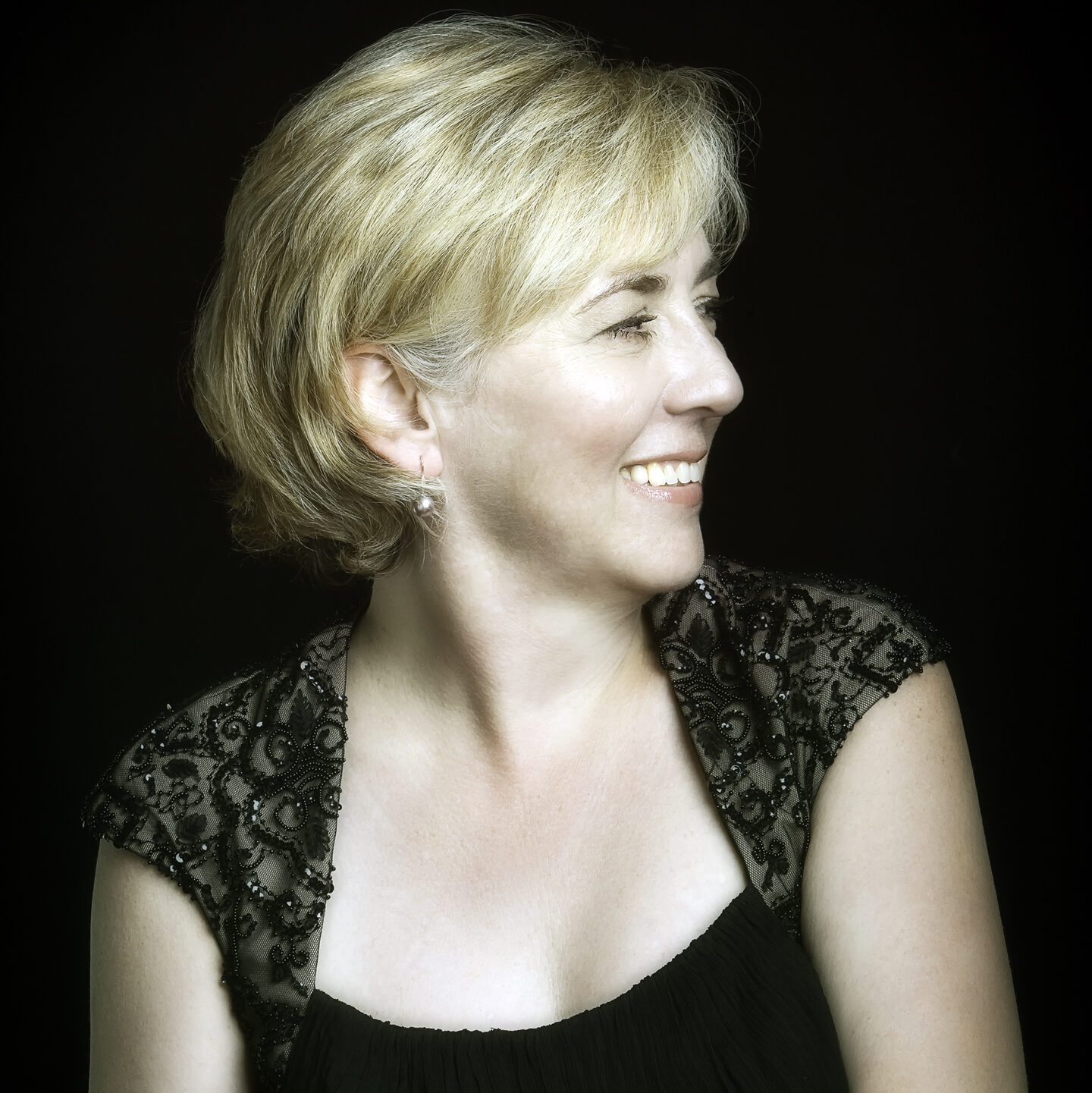
Pianist Bernadene Blaha is internationally recognized as a recitalist, concerto soloist, and chamber musician. Lauded by Piano and Keyboard Magazine for her “integrity” and “total clarity of line,” Blaha began her musical journey in Canada before gaining prominence with top awards at the Montreal Symphony Orchestra Competition, Lugano Switzerland Masterplayer’s International Competition, and New York City’s International Piano Competition. These prizes led to acclaimed recitals at Carnegie Recital Hall and the Lincoln Center Library in New York City. She was also featured at the XXIX International Chopin Festival in Marianske Lazne, followed by appearances at such distinguished venues as the Concertgebouw, Salle Cortot, Phillips Collection, National Arts Center, and Disney Hall.
In 2009, Blaha co-founded the piano trio Latitude 41 with Livia Sohn and Luigi Piovano. The group’s debut album, featuring Schubert’s monumental Trio in E flat, received high praise. With a rich discography, Blaha has recorded for CBC, Centaur, Analekta, Eloquentia, and Naxos. Her most recent album of Polish Violin Sonatas (Noskowski and Żeleński) with Swiss violinist, Laurence Kayaleh was released in December 2023 on the Naxos Label.
Currently based in Los Angeles, Bernadene Blaha is a professor at the University of Southern California’s Thornton School of Music.
Acknowledgements
ABOUT THE USC POLISH MUSIC CENTER
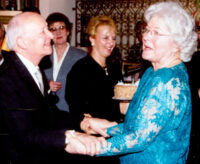
(Pictured: Composer Witold Lutosławski and PMC founder Wanda Wilk at the Wilk home in Los Angeles in 1993.)
Established in 1985 by Dr. Stefan and Wanda Wilk, the Polish Music Center at the USC Thornton School of Music is a unique research and cultural outreach center for scholars, musicians, journalists and lovers of Polish music. Located in downtown Los Angeles, the Center’s extensive and growing Archival and Library Collections contain books, scores, manuscripts, recordings, periodicals, documents, reference materials and numerous other items related to Polish music.
The PMC provides a broad range of services to the USC community, audiences in California and the public worldwide through concerts, the Polish Music History book series, and the PMC website that, since 1994, has provided a wealth of information, including biographies and catalogues of works, a monthly Newsletter, recordings and repertoire by Polish composers, and articles on the history of Polish music and dance. The Annual Paderewski Lecture-Recital is the flagship event of the PMC, honoring both the role in California’s history and connection to USC of this eminent composer-statesman by spotlighting current achievements in Polish music.
The PMC staff is comprised of pianist and composer Marek Zebrowski, who serves as PMC Program Director and Curator, singer and cultural diplomat Krysta Close, who is the PMC’s Assistant Director and Newsletter Editor, and in summer 2023 we welcomed guitarist Tomasz Fechner, our new Archives Specialist. The staff is supported by several student workers and dedicated volunteers.
The cornerstone of our Archives, the Manuscript Collection was initiated in 1984 with gifts of original scores by Stanisław Skrowaczewski and Witold Lutosławski. Their generous contributions became the foundation for one of the world’s most important collections of manuscripts by modern Polish composers. Today the collection holds over 300 manuscripts by Bacewicz, Baird, Laks, Meyer, Penderecki, Ptaszyńska, Schaeffer and Tansman, among many others. Other important Collections received since 2005 include the Henry Vars [Henryk Wars] Collection, Zygmunt and Luisa Stojowski Collection, Bronisław Kaper Collection, Paderewski Archive – The Paso Robles Collection, Roman Ryterband Collection and Joanna Bruzdowicz Collection.
Since 2006 the PMC has organized the Paderewski Festival in Paso Robles and, together with the Festival Board of Directors and partners in Poland, it runs the Festival Youth Exchange Program for students from California’s Central Coast, Poland and Ukraine. In addition to serving as a research base and a conduit for musicians who perform at the Festival, the PMC provides participants in the Paderewski Piano Competition and Cultural Exchange with the opportunity to take part in master classes with members of the world-renowned Thornton School of Music faculty.
Another exciting ongoing partnership is with Poland’s State Archives and the Archives of Historical Documents in Warsaw, which since 2014 has sent scholars to catalogue and conserve our unique Archival Collections. This cooperation dovetails with a 2019 transformational gift that created the Dianne and Tad Taube Polish Music Center Digital Archives at the USC Thornton School of Music, now accessible online via the USC Digital Library.
FRIENDS OF POLISH MUSIC
PMC BENEFACTORS
Dr. and Mrs. Clark Halstead
Lottie Harasimowicz
Dr. and Mrs. Kenneth Harris
Dr. and Mrs. Matthew Mickiewicz
Dr. Helena Nowicka
Drs. Zbigniew and Zofia Petrovich
Dianne and Tad Taube
Dr. Stefan and Wanda Wilk
The USC Polish Music Center would like to express our deepest gratitude to the following donors who contributed during the last fiscal year:
Anne and Terrence Anderson
Jennifer Audette
Stan Bartosiak
Benevity*
Lukasz and Bozenna Bogucki
Charles and Alice Bragg*
Malgorzata and Slawomir Brzezinski*
Cynthia and Thomas Bylander
Dr. Bartosz Chmielowski and Rich Gallion*
Consulate General of the Republic of Poland in L.A., Hon. Mateusz Gmura*
Cyryla Cravens*
Andrzej and Nina Dabrowa*
Diana and Robert Eisele*
Piotr Gajewski
Juliana Gondek
Helena Modjeska Art and Culture Club of LA
Edward Hoffman
Dr. Stephen Hryniewicki
Magdalen Hull
Anna Kane
Zbigniew and Malgorzata Kostecki
Krystyna and Boguslaw Kuszta*
Robert and Linda Lombardi*
Andrew and Joanna Maleski*
Grace Malolepszy*
Jan Matusak
Lucyna Migala
Alicja Mogilski
Susan Moss
Dr. Eva Muchnick*
Danuta Nowicki
Dr. Zbigniew and Dr. Zofia Petrovich*
Edward and Maria Pilatowicz*
Krzysztof Pilch and Dr. Marianna Chodorowska-Pilch*
POLAM Federal Credit Union*
Wanda Presburger
Danuta Rudnicki
Clarissa Ryterband*
Waldemar W. Sadowinski
Christine Singer*
Miroslaw and Elzbieta Smogorzewski
Prof Nick and Toni Strimple*
Dr. Janusz Supernak
Witold Swierczewski*
Blanka Rosenstiel
The Rosenstiel Foundation
Theodora Emily Karczewski
Elzbieta Trybus
Scott Westbrook*
Scott Whittle and Terry Tegnazian*
Daniela and Richard Zarakowski*
Roman Zawadzki
* Sustaining Members (donors who have given gifts of $100 or more for at least 3 years in a row)
The Polish Music Center also would like to thank Dean Jason King, Jeffrey De Caen, Evan Calbi, Sean David Christensen, Phoenix Delgado, Deanna Gasparyan, Adriana Gonzalez, Tori Nagle, Heather Pio Roda, Allie Schulz and the entire staff at the USC Thornton School of Music for their assistance in organizing and marketing this event.

Ensemble
Verona Quartet:
Jonathan Ong, violin
Dorothy Ro, violin
Abigail Rojansky, viola
Jonathan Dormand, cello
with guest pianist, Bernadine Blaha